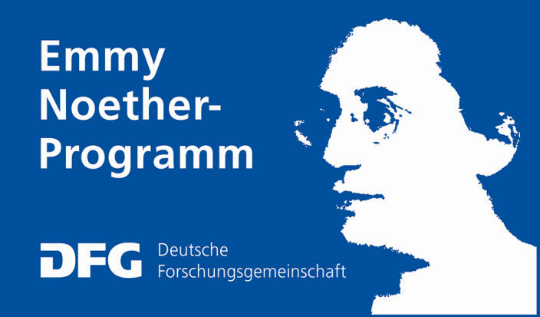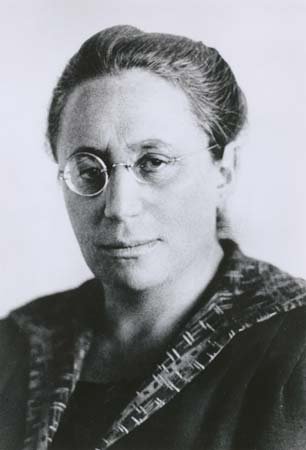Emmy Noether

The name Emmy Noether is not only frequently encountered by researchers in mathematics and physics in a professional context. In particular, the funding program of the German Research Foundation (DFG) named after her is known to many young researchers across disciplines. But who was this woman who gained her reputation in an environment that systematically disadvantaged women professionally and assigned them a different socio-political role than that of an excellent scientist?
Amalie Emmy Noether, born on March 23, 1882 in Erlangen, is one of the most important mathematicians of the 20th century. Her groundbreaking work in the fields of algebra and theoretical physics had a lasting influence on the foundations of modern mathematics and physics.
Early life and education
Emmy Noether grew up in a family that also provided her daughter with a good early education, even though girls were not allowed to attend grammar school at the time. Her father Max Noether was a professor of mathematics at the University of Erlangen and presumably had a strong influence not only on Emmy, but also on her younger brother Fritz, who later also worked as a mathematician. She completed her A-levels in 1903 by a roundabout route and studied first in Göttingen and then in Erlangen.
Having completing her doctorate with summa cum laude in 1907 she worked in her father's department without official status (postdoctoral positions were reserved exclusively for men) and without payment. In 1915, she was invited to move to the Georg-August University of Göttingen, the world's most important center of mathematical research at the time. Despite being endorsed by David Hilbert, among others, her application for habilitation was ultimately rejected by the responsible ministry with reference to the prohibition of habilitation for women.
After significant improvements for women were achieved in the Weimar Republic, she finally became the first woman in Germany to habilitate in mathematics in 1919. The status of Privatdozentin achieved with her habilitation was followed in 2022 by the title of "non-civil servant associate professor", which she was also the first woman in Germany to receive. However, she did not receive an endowment - albeit a small one - until 1923 through a lectureship, which had to be applied for each year. Unlike her brother Fritz, she never received a full professorship despite her outstanding achievements. During this time, she made a living from a small inheritance from her late father.
Scientific contributions
From 1918 onwards, she published widely acclaimed, disruptive essays. Her work is divided into two main areas: abstract algebra and theoretical physics. In algebra, she developed the so-called Noether theory, which describes the structure of rings and solids and forms the basis for many modern algebraic concepts. Her work on invariant theory and ideal theory is still of central importance today.
In physics, Emmy Noether is best known for the Noether theorem named after her. This theorem, which she published in 1918, establishes a fundamental link between symmetries and conservation laws in physics. It states that every continuous symmetry of a physical system leads to a conservation quantity, such as the conservation of energy from time invariance. This theorem is a cornerstone of modern theoretical physics and has far-reaching applications in quantum mechanics and the theory of relativity.
Life in science
In addition to her outstanding research work, she had a great influence on the next generation of mathematicians due to her teaching activities. Many of her doctoral students went on to become respected mathematicians, which underlines her lasting impact on the mathematical community.
She held visiting professorships in Moscow (1928/29) and Frankfurt a. M. (1930) and received prestigious awards for her scientific achievements.
As a Jew, Emmy Noether was affected by the so-called "Law for the Restoration of the Professional Civil Service" in 1933, with which the National Socialists attempted to remove Jewish and politically unpopular persons from the civil service. Although she was not a professor, Emmy Noether lost her job and emigrated to the USA at the end of 1933. There she worked at Bryn Mawr Women's College as a visiting professor (for the first time with an adequate income).
Emmy Noether died on April 14, 1935 as a result of an operation.
Emmy Noether remains an inspiration to all who advocate for equality in science, and her contributions to mathematics and physics are a lasting legacy that has changed science forever.
Sources:
- https://de.wikipedia.org/wiki/Emmy_Noether, accessed 5/13/2025
- "Emmy Noether is in every mathematical application", article in VDI nachrichten from 14.4.2025, author: Martina Schneiders, www.vdi-nachrichten.com/technik/technikgeschichte/emmy-noether-steckt-in-jeder-mathematischen-anwendung/
- Photo source: Emmy Noether, publisher: Encyclopædia Britannica, URL: https://www.britannica.com/biography/Emmy-Noether#/media/1/417132/39562, accessed 5/13/2025
- Summary of the scientific work by Copilot
Author:
Equal Opportunities and Diversity Management
Deputy Head of Department

